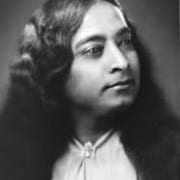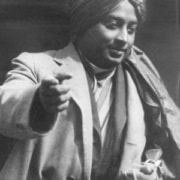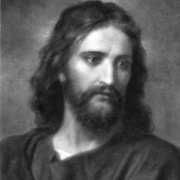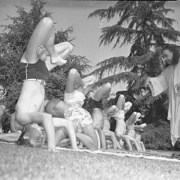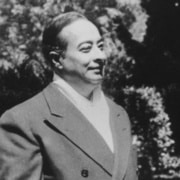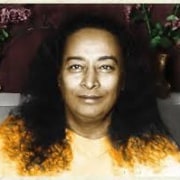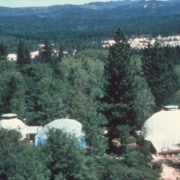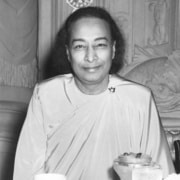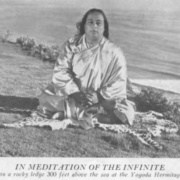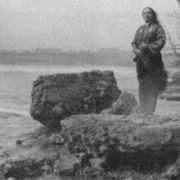Some of my most impressive memories of Master are of his public lectures. While they lacked the sweet intimacy of talks with the disciples at Mt. Washington, they rang with the spirit of a mission destined, he told us, to bring spiritual regeneration to the world.
I remember especially how stirred I was by a talk he gave at a garden party in Beverly Hills on July 31, 1949. Never had I imagined that the power of human speech could be so great; it was the most stirring lecture I have ever heard.
“This day,” he thundered, punctuating every word, “marks the birth of a new era. My spoken words are registered in the ether, in the Spirit of God, and they shall move the West…. Self-Realization has come to unite all religions…. We must go on ó not only those who are here, but thousands of youths must go North, South, East and West to cover the earth with little colonies, demonstrating that simplicity of living plus high thinking lead to the greatest happiness!” I was moved to my core. It would not have surprised me had the heavens opened up and a host of angels come streaming out, eyes ablaze, to do his bidding. Deeply I vowed that day to do my utmost to make his words a reality.
Often during the years I was with Master he exhorted his audiences on the subject of this cherished dream of his: “world-brotherhood colonies,” or spiritual cooperative communities ó not monasteries, merely, but places where people in every stage of life could devote themselves to living the divine life.
“Environment is stronger than will power,” he told us. He saw “world-brotherhood colonies” as environments that would foster spiritual attitudes: humility, trust, devotion, respect for others, friendly cooperation. For worldly people, too, who dream of a better way of life, small cooperative communities offer the best hope of demonstrating to society at large that mankind is capable of achieving heights that are so scornfully repudiated in this age of spiritual underachievers. Such communities would be places where cooperative attitudes were emphasized, rather than social and political “rights” and the present social and business norms of cut-throat competition.
“Gather together, those of you who share high ideals,” Yogananda told his audiences. “Pool your resources. Buy land out in the country. A simple life will bring you inner freedom. Harmony with nature will bring you a happiness known to few city dwellers. In the company of other truth seekers it will be easier for you to meditate and think of God.
“What is the need for all the luxuries people surround themselves with? Most of what they have they are paying for on the installment plan. Their debts are a source of unending worry to them. Even people whose luxuries have been paid for are not free; attachment makes them slaves. They consider themselves freer for their possessions, and don’t see how their possessions in turn possess them!”
He added: “The day will come when this colony idea will spread through the world like wildfire.”
In the over-all plan for his work, Paramhansa Yogananda saw individual students first receiving the SRF lessons, and practicing Kriya Yoga in their own homes; then, in time, forming spiritual centers where they could meet once or twice weekly for group study and meditation. In areas where there was enough interest to warrant it, he wanted SRF churches, perhaps with full- or part-time ministers. And where there were enough sincere devotees to justify it, his dream was that they would buy land and live together, serving God, and sharing the spiritual life together on a full-time basis.
As I mentioned in Chapter Seventeen, Master had wanted to start a model world-brotherhood colony in Encinitas. He felt so deeply the importance of this communitarian dream that for some years it formed the nucleus of all his plans for the work. Indeed, ruler of his own mental processes though he was, even he on one occasion became caught up in a whirlwind of enthusiasm for this project. He told a congregation one Sunday morning, “I got so involved in thinking about world-brotherhood colonies last night that my mind got away from me. But,” he added, “I chanted a little, and it came back.”
Another measure of his interest may be seen in the fact that the first edition of Autobiography of a Yogi ended with a ringing report of his hopes for founding such a colony. “Brotherhood,” he wrote in that edition, quoting a discussion he had had with Dr. Lewis in Encinitas, “is an ideal better understood by example than precept! A small harmonious group here may inspire other ideal communities over the earth.” He concluded, “Far into the night my dear friend “the first Kriya Yogi in America” discussed with me the need for world colonies founded on a spiritual basis.”
Alas, he encountered an obstacle that has stood in the way of every spiritual reform since the days of Buddha: human nature. Marriage has always tended to be something of a closed corporation. The economic depression of the Nineteen-Thirties had had the effect on a generation of Americans of heightening this tendency by increasing their desire for worldly security. “Us four and no more” was the way Yogananda described their attitude. America wasn’t yet ready for world-brotherhood colonies.
A further difficulty lay in the fact that the core of his work already was his monastic disciples. It was they who set the tone for all the colonies. Householders couldn’t match their spirit of self-abnegation and service. Families were crowded out of the communal garden, so to speak, by the more exuberant growth of the plants of renunciation. But Yogananda was too near the end of his mission to fulfill his “world-brotherhood colony” dream elsewhere.
“Encinitas is gone!” he lamented toward the end of his life. It was not that the ashram was lost. What he meant was that his plans for founding a world-brotherhood colony on those sacred grounds would not be fulfilled ó at least not during his lifetime. He stopped accepting families into the ashrams, all of which he turned now into full-fledged monasteries. For in his renunciate disciples he found that spirit of selfless dedication which his mission needed for its ultimate success.
Nevertheless, the idea of world-brotherhood colonies remained important to him. It was, as he had put it during that speech in Beverly Hills, “in the ether, in the Spirit of God.” Kamala Silva, in her autobiography, The Flawless Mirror, reports that as late as five months before he left his body he spoke to her glowingly of this dream of his. Master knew that, eventually, the dream must be fulfilled.

